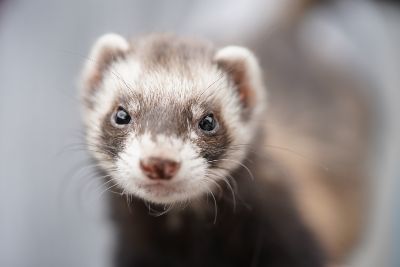As a youth, I kept ferrets as pets, and I must admit that I adored them. With their playful and mischievous nature, they are a pleasure to own.
Superb Hunters
But did you know that they were first domesticated around 2,500 years ago as they were superb hunters of rabbits and rodents? However, as pets, they need special care and attention to ensure their well-being. In this article, we will set out the most important information on how to look after ferrets as pets.
1. Diet:
Ferrets are obligate carnivores, so their diet should primarily consist of high-quality meat-based foods. Commercial ferret food offers a well-balanced diet, but select products with at least 30-40% protein and 15-20% fat. They also appreciate raw food: chicken necks, beef chunks and slices of offal. Treats can be given, but avoid fruits, vegetables, grains, or dairy products.
2. Habitat:
Ferrets thrive in a spacious and stimulating environment. A large cage with multiple levels, toys and tunnels will keep them entertained. Bars should be less than half an inch apart. Line the floor with bedding material and provide ferret-friendly litter.
3. Exercise:
Ferrets are energetic and curious requiring regular exercise outside their cage. Create a safe and dedicated ferret-proofed room play area, ensuring there are no holes to escape through or poisonous items within reach. Put aside at least two hours for playtime each day, offering toys to keep them mentally stimulated. Remember to supervise them during their play sessions. But beware of getting them excited, as they can be silly with their teeth and claws if over-stimulated!

4. Grooming:
Ferrets have a short coat that requires minimal grooming. Regularly brush their fur with a soft brush to remove loose hair and minimize shedding. Bathe them only when necessary as it can strip away their natural oils. Use a ferret shampoo to prevent drying out their skin.
5. Health Care and Handling:
Regular veterinary check-ups are crucial to ensure your ferret’s overall health and vaccinations against distemper are advised. Toothbrushing may be necessary to prevent dental problems, but not if suitable foods are provided. Keep an eye on their claws, as trims are occasionally needed. Ensure the ferret is handled carefully and sympathetically, as remember, they can bite if upset.
A Balanced Diet
By providing a balanced diet, a stimulating habitat, regular exercise, proper grooming, and routine veterinary care, you can ensure a happy and healthy life for your ferret. Always remember to research and consult with professionals to stay up to date with the latest information on ferret care. With love and proper care, your ferret will become a cherished member of your family.
Click here for more pet articles or visit the Beastly Thoughts Professional Dog Services website here.



